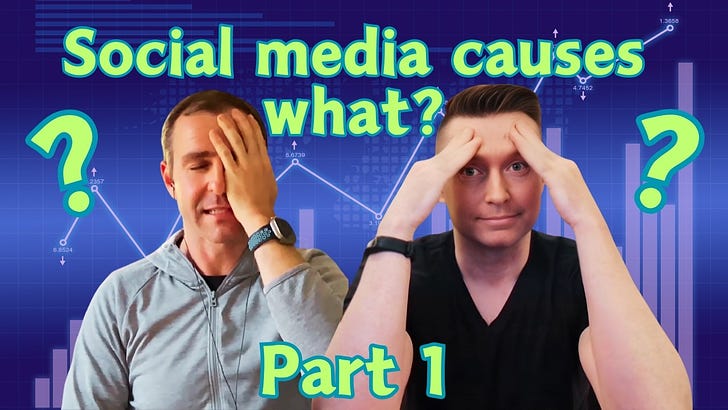Teen Safety Interview, plus News!
Do the data actually support the extreme claims that social media is worse than heroin?
The debate around tech policy, particularly in the space of online child safety, has been rather spicy. Some folks have been making claims that social media is more harmful than heroin, even though the data tell a very different story. This inspired me to interview one of the world’s top scientists on the relationship between technology use and well-being and Oxford Professor, Andrew Przybylski. I posted our conversation on YouTube in two separate parts.
The first part focuses on what the data does and does not say.
The second part focuses more on specific solutions, and their likelihood of success or failure based on their implementation in other countries, or even on the local level within the United States.
If you haven’t subscribed to my channel yet, please do. It’ll be a tremendous help to me, and I’ll be forever grateful to you.
What I’m reading
College students used Meta’s smart glasses to dox people in real time -- Victoria Song, The Verge
Australia’s planned social media ban raises teen isolation fears -- Byron Kaye & Cordelia Hsu, Reuters
Elon Musk’s X dodges EU’s DMA as bloc decides platform isn’t important enough -- Natasha Lomas, TechCrunch
TikTok executives know about app’s effect on teens, lawsuit documents allege -- Bobby Allyn, Sylvia Goodman, & Dana Kerr, NPR
Elon Musk expands his empire of misinformation -- Allison Morrow, CNN
Meta’s Yann LeCun says worries about AI’s existential threat are ‘complete BS’ -- Anthony Ha, TechCrunch
Will AI grow so powerful it can threaten us? Chief Meta scientist says: ‘Pardon my French, but that’s complete BS.’ Which is the attitude I would expect from any company with so much skin in the AI game -- James Bentley, PCGamer
Former Google CEO says climate goals are not meetable, so we might as well drop climate conservation -- unshackle AI companies so AI can solve global warming -- Jowi Morales, Tom’s Hardware
Instagram and Threads moderation is out of control -- Umar Shakir, The Verge
Bluesky gains half a million new users in one day after X changes how blocking works (so the blocked can see when someone blocks them) -- Matt Binder, Mashable
Elon Musk’s X is losing users in the US, UK, and EU. X’s own data proves it. -- Matt Binder, Mashable
‘It’s not a solution for teen girls like me’: Instagram’s new under-18 rules met with skepticism -- Alaina Demopoulous, The Guardian
TikTok’s parent launched a web scraper that’s gobbling up the world’s online data 25 times faster than OpenAI -- Kali Hays, Fortune





I'd love to see debate between Jon Haidt and his detractors on this topic--like that 2015 (?) SPSP when he went head-to-head with Kurt Gray--because I find his claims to be pretty convincing and include references to causal studies, and I see critiques like Professor Przybylski's above (caveat: I only watched the first video) tend to make a lot of "correlation!=causation" without addressing the causal evidence that exists.
Specifically, in your discussion there was an assumption there is no experimental evidence for reduced well-being from social media. But Haidt, Rausch, & Twenge's ongoing review [1] currently lists 38 "experiments using random assignment that indicate a causal effect on mental health outcomes". And perhaps no one has specifically run this on children, or maybe the evidence is mixed (Haidt et al's doc also lists another 9 experimental studies that found no effect) but I get the feeling of two groups talking past each other when one side lists 47 mixed experimental findings and the other side seems to be saying there is no evidence at all. I haven't really taken the time to assess those 47 mixed experimental findings--maybe none are relevant or meaningful--but it seems like they need to be grappled with to have a serious debate on this topic?
After a lengthy discussion where Przybylski describes why he thinks Haidt doesn't have the evidence he needs to support his own claims, he then asserts without describing any evidence at all that "abstinence doesn't work". I don't think the analogy to sex abstinence education really carries over any lessons about, say, a school mandating that its students keep cellphones out of the classroom. Surely evidence is required to assert a null effect equally as much as when asserting an effect?
[1] https://docs.google.com/document/d/1w-HOfseF2wF9YIpXwUUtP65-olnkPyWcgF5BiAtBEy0/edit?tab=t.0#heading=h.npba6tvfpq0g